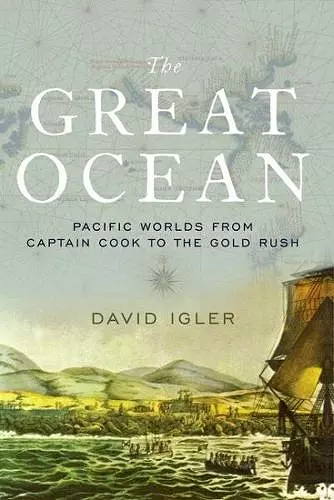The Great Ocean
Pacific Worlds from Captain Cook to the Gold Rush
Format:Paperback
Publisher:Oxford University Press Inc
Published:20th Apr '17
Currently unavailable, and unfortunately no date known when it will be back
This paperback is available in another edition too:
- Hardback£42.99(9780199914951)

The Pacific of the early eighteenth century was not a single ocean but a vast and varied waterscape, a place of baffling complexity, with 25,000 islands and seemingly endless continental shorelines. But with the voyages of Captain James Cook, global attention turned to the Pacific, and European and American dreams of scientific exploration, trade, and empire grew dramatically. By the time of the California gold rush, the Pacific's many shores were fully integrated into world markets-and world consciousness. The Great Ocean draws on hundreds of documented voyages--some painstakingly recorded by participants, some only known by archeological remains or indigenous memory--as a window into the commercial, cultural, and ecological upheavals following Cook's exploits, focusing in particular on the eastern Pacific in the decades between the 1770s and the 1840s. Beginning with the expansion of trade as seen via the travels of William Shaler, captain of the American Brig Lelia Byrd, historian David Igler uncovers a world where voyagers, traders, hunters, and native peoples met one another in episodes often marked by violence and tragedy. Igler describes how indigenous communities struggled against introduced diseases that cut through the heart of their communities; how the ordeal of Russian Timofei Tarakanov typified the common practice of taking hostages and prisoners; how Mary Brewster witnessed first-hand the bloody "great hunt" that decimated otters, seals, and whales; how Adelbert von Chamisso scoured the region, carefully compiling his notes on natural history; and how James Dwight Dana rivaled Charles Darwin in his pursuit of knowledge on a global scale. These stories--and the historical themes that tie them together--offer a fresh perspective on the oceanic worlds of the eastern Pacific. Ambitious and broadly conceived, The Great Ocean is the first book to weave together American, oceanic, and world history in a path-breaking portrait of the Pacific world.
Winner of the John Lyman Book Award for U.S. Maritime History of the North American Society for Oceanic History
Igler makes good use of published and accessible source materials of the nineteenth century maritime world...as well as the emerging interdisciplinary realm of cultural geography and history. ... The basic theme [of the book]...is an important contribution that is well delivered in a slender, accessible, and attractive book. * Oregon Historical Quarterly *
An admirable example of the new international intercultural maritime history .Igler charts the economic, demographic, and cultural changes that define the period between the 1780s and 1840s as one of transformation. * CHOICE *
The Great Ocean transports the reader on the winds of trade or the trade winds to the multiple worlds of commerce and systems of knowledge created by Pacific Islanders, Native Americans, and Europeans. Its scale is grand, embracing waters and lands, humans and animals, and the imperial Pacific while not losing sight of the individuals who negotiated that history-a remarkable achievement. * Gary Okihiro, author of Island Worlds: A History of Hawai`i and the United States *
Here is U.S. history, maritime history, Pacific Islands history, world history, environmental history, labor history, social history all in one volume, and all beautifully done. A host of topics * early encounters in the Hawaiian Islands, the economic significance of whaling, the differences and similarities in how various powers established their presences in the Pacific, and morelook different once Igler is done with them. Surprises abound, but so does careful, balanced synthesis. What more could a reader want?Kenneth Pomeranz, University of Chicago *
David Igler's The Great Ocean is a majestic contribution to the globalizing of American history, and an original, environmentally-informed peregrination around North and South America, Oceania, and Asia. Igler follows traders and merchants, epidemic plagues, the slaughter and near decimation of marine mammals, captives and hostages, and the nineteenth-century articulation of a truly Pacific-based natural history of geology, oceanography, climatology, and American empire. It is an allusive work, engaging, richly detailed, and full of compelling stories that change our understanding of life across generations, in and around the world's greatest ocean. * Matt K. Matsuda, Rutgers University *
- Winner of Winner of the Sally and Ken Owens Award of the Western History Association.
ISBN: 9780190498757
Dimensions: 231mm x 155mm x 20mm
Weight: 386g
272 pages